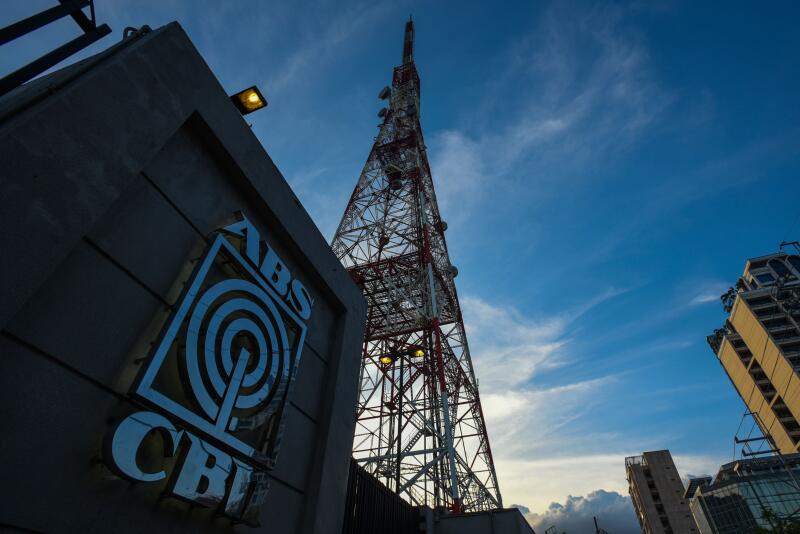Philippine lawmakers vote to shut down top broadcaster ABS-CBN
Sign up now: Get insights on Asia's fast-moving developments

ABS-CBN closed over 40 TV stations and some 20 radio stations nationwide.
PHOTO: AFP
MANILA - Philippine lawmakers on Friday (July 10) rejected ABS-CBN's bid for a fresh franchise, shutting down for good a media giant that, through its vast network and stable of popular journalists, has played a pivotal role in shaping the country's politics.
The move ended the 66-year-run of a broadcaster that rose to prominence during post-war reconstruction, survived a government takeover under the dictator Ferdinand Marcos, regained its position as a dominant force in media after a popular uprising that overthrew the Marcos regime in 1986, and now must again wind down under a president who has chafed at what he saw as the network's unfair reporting of his reign.
Civil rights activists say the decision is a warning to journalists in the country that political persecution awaits them if they go too far in criticising President Rodrigo Duterte and his government, allies and family.
"The political persecution of ABS-CBN sends a chilling message to Filipino media practitioners and journalists: toe the line or get shut down," said Senator Risa Hontiveros, an opposition politician.
Congress' vote to deny ABS-CBN a franchise follows a guilty verdict in a recent libel case against prominent journalist Maria Ressa, whose online news site Rappler has also been targeted by Mr Duterte, and the passing of a sweeping anti-terror law that critics say will be used to intimidate government critics.
But lawmakers who voted to deny ABS-CBN a franchise said the issue was never about press freedom.
"If it were so, then all applications for legislative franchises covering mass media could simply claim such freedom and force the hand of (Congress) each time," they said in a joint report.
Philippine regulators on May 5 shut down ABS-CBN a day after its 25-year congressional franchise expired.
The network closed its over 40 TV stations and some 20 radio stations nationwide. It then stepped up efforts to lobby for a new licence.
At least five congressmen allied under a loose coalition supporting Mr Duterte sought to block the broadcaster's licence.
They argued that ABS-CBN's majority owner Eugenio Lopez III, while also a Filipino, held an American passport.
The network also sold investment papers known as "depository receipts" to companies abroad.
These violated provisions in the Philippine Constitution requiring 100 per cent Filipino ownership of media organisations, they said.
They also accused the network of dodging taxes, summarily firing employees and biased reporting.
But lawmakers defending the broadcaster said justice and securities officials who testified before Congress said Mr Lopez, despite his dual citizenship, was not barred by the Constitution from owning stocks in ABS-CBN, as he remained 100 per cent Filipino.
The depository receipts also did not grant holders shares or control over the network, they added.
Tax officials said ABS-CBN had not been "delinquent", as it regularly pays its taxes, and does not use its subsidiaries as "tax shields".
It paid some 71.5 billion pesos (S$2 billion) in taxes from 2003 to 2019, making it among the country's top taxpayers, they disclosed.
Labour officials said there were cases lodged against ABS-CBN, but most were already being mediated.
Officials in charge of ABS-CBN's news department told lawmakers the broadcaster has always tried to report the news "in an accurate, fair and balanced manner".
Skewed reporting, inaccuracies and corruption are constantly being dealt with, they said.
ABS-CBN has said it would have to lay off some 11,000 employees, talents and contractors if it is forced to wind down its operations.
Tens of thousands of small, ancillary businesses that rely on the top broadcaster for much of their income would also be displaced, it added.
Representative Carlos Zarate, of the party-list group Bayan Muna (People First), told The Straits Times ABS-CBN's closure would have a "big impact" on the 2022 elections, when Mr Duterte is set to step down after a six-year term.
"They will be taking out a broadcaster that provides an influential venue to balance political views," he said.
The news website Politiko.com reported that the influential Iglesia ni Cristo (Christ's Church), a 3-million strong religious group that positions itself as a rival to the Catholic Church, is keen on securing ABS-CBN's frequency.
Mr Duterte's son, Representative Paolo Duterte, has also been lobbying against ABS-CBN, it said.
House Speaker Alan Peter Cayetano dismissed this as "clumsy attempts at mind-conditioning".
ABS-CBN is known for its prime-time flagship news programme, TV Patrol, as well as soaps and afternoon variety TV shows. Its offerings also include coverage of popular sports such as basketball and boxing.
When it was still on air, ABS-CBN's programmes were beamed to nine out of every 10 homes.
It was that reach that allowed the network to set each week's political agenda. Politicians and policymakers were often compelled to respond and act on what they saw and heard being blared through the network.
But that influence also courted enemies who saw ABS-CBN as a partisan political player, often lumped with the perceived leanings of the Lopez family and their long-time ties to the family of the late president Corazon Aquino.
Those foes included Mr Duterte, who accused the network of siding with his political enemies when it refused to air one of his political ads when he was running for president.
Mr Duterte has been threatening to shut down ABS-CBN since he took office in 2016.


